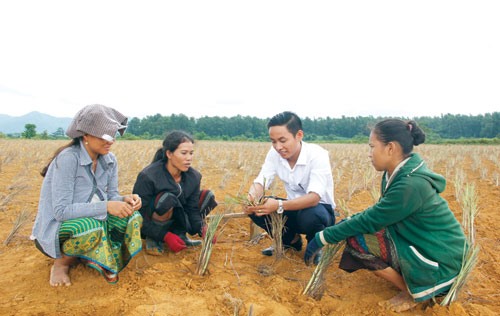 Society
Society

The young man leaves the city to go home with villagers to grow lemongrass in Quảng Bình
 |
| Today many ethnic minority women from the Vân Kiều and Pa Ko communities living in the mountainous commune of Hải Phúc in Đakrông District are growing cây xả (lemongrass) under Lê Huệ’s guidance. — Photo danviet.vn |
QUẢNG BÌNH – Lê Huệ was born in poverty-stricken An Xá Village in Quảng Trị Province.
He studied well at school, and was able to get admitted to the Đà Nẵng University. After he graduated with a bachelor’s degree in construction engineering, he found work with the Institute of Research and Handicraft Development.
He had done well for himself. However, about three years of working, he quit his job and returned to his native place to engage in farming.
His mother, relatives and friends opposed the decision, arguing that giving up a stable job would not be good for his career, but Huệ was determined.
It was not a naive decision.
While working at the research institute (2013- 2015) he had joined foreign-invested hi-tech agriculture projects carried out in ethnic minority areas of ĐaKrong (Quảng Trị Province) and Tây Giang (Quảng Nam Province) districts.
The projects, funded by the Netherlands, Germany, and China, helped about 1,000 ethnic minority women earn more money and improve their lives.
On a working visit to the northern provinces of Ninh Bình, Lào Cai and Nghệ An, he found local farmers reaping handsome gains by growing herbs.
It made him wonder if this success could be replicated back home in Quảng Trị, where there was a lot of land but harsh climatic conditions.
"I only thought that what other people can do, my villagers can do, too. So I learnt the techniques of growing lemongrass and making essential oils.”
To make sure he learned the right things, he spoke directly to agricultural experts. He was motivated and encouraged by them to cultivate herbs, especially lemongrass.
Lemongrass is a valuable herb with many uses. It is used in cooking, and its essential oil is used by the pharmaceutical and cosmetic industries. It was also a product with high export potential.
However, when Huệ spoke about cultivating this herb, he met opposition from his family, especially his mother, who felt it was best that he persisted with good job and stable salary of several million đồng. No one in the province had done anything like that, she pointed out.
However, Huệ’s mind was made up. Towards the end of 2015, he resigned from the research institute and borrowed VNĐ200 million from family, relatives and friends to rent a 5ha plot in Cam Lộ Town to grow lemongrass.
He signed a product consumption agreement with a co-operative in Ninh Bình Province, collected and purchased stalks from local households.
"When I began planting the stalks, many local people shook their heads and worried about my job. Sometimes, someone would call and ask: “Are the shrubs still alive?’
Alongside growing the herb, he had to raise more money to buy two distilleries costing VNĐ150 milion each.
But the care he took of the shrubs ensured that they had high oil content, and would earn a stable income. In 2016 alone, he harvested four crops and distilled 1,500 liters of oil, earning VNĐ400 million.
“On average, I can earn a profit of VNĐ80 million from a hectare of lemongrass,” he said. He also began intercropping, planting hundreds of guava, mango and lemon trees, and the fruit trees yielded an extra income of VNĐ40 million per year. There was another added benefit.
"Lemongrass keeps harmful insects away, so the fruit grower doesn’t need to spray insecticides," Huệ said.
Huệ visited many areas in the country growing herbs as he looked for consumption markets, and he was able to get several export orders for a thousand litres of essential oils per month.
He invited villagers to his farm so that they could see the whole process, from growing lemongrass to making the oil.
He also assisted many households with fertilizers and stalks, guided them on cultivation and processing, and signed contracts to purchase products.
Huệ said the best time to grow lemongrass was September. At an average of 40,000 shrubs per hectare. Each hectare yields up to 100 tonnes of raw material per year, which can be turned into 300 liters of essential oil worth VNĐ180 million.
In Đakrong District, farmers have planted more than 25ha of lemongrass while Gio Linh District has dedicated 30ha to the herb.
Today many ethnic minority women from the Vân Kiều and Pa Ko communities living in the mountainous commune of Hải Phúc in Đakrông District, about 50km from Đông Hà City, are growing cây xả (lemongrass) under Lê Huệ’s guidance.
One woman said that in the past, the Vân Kiều and Pa Kô suffered great poverty, but cultivating herbs like lemongrass has improved their living standards now.
Huệ has expanded his business, producing 2,500 litres of tea tree (cây tràm) oil last year, earning VNĐ1.5 billion. .
His farm has created permanent jobs for 50 people and provides seasonal work to 100 others. Huệ plans to process aromatherapy oils from other herbs and set up a website to introduce his products. — VNS